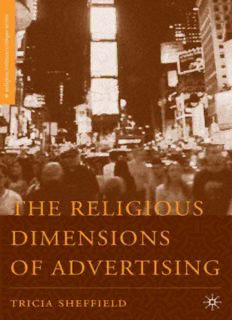
The Religious Dimensions of Advertising PDF
Preview The Religious Dimensions of Advertising
The Religious Dimensions of Advertising Religion/Culture/Critique Series editor: Elizabeth A. Castelli How Hysterical: Identification and Resistance in the Bible and Film By Erin Runions (2003) Connected Places: Region, Pilgrimage, and Geographical Imagination in India By Anne Feldhaus (2003) Representing Religion in World Cinema: Filmmaking, Mythmaking, Culture Making Edited by S. Brent Plate (2003) Derrida’s Bible (Reading a Page of Scripture with a Little Help from Derrida) Edited by Yvonne Sherwood (2004) Feminist New Testament Studies: Global and Future Perspectives Edited by Kathleen O’Brien Wicker, Althea Spencer Miller, and Musa W. Dube (2005) Women’s Renunciation in South Asia: Nuns, Yoginis, Saints, and Singers Edited by Meena Khandelwal, Sondra L. Hausner, and Ann Grodzins Gold (2006) Retheorizing Religion in Nepal By Gregory Price Grieve (2006) The Religious Dimensions of Advertising By Tricia Sheffield (2006) Gender, Religion, and Culture in the Premodern World Edited by Brian Britt and Alexandra Cuffel (2007) T R D HE ELIGIOUS IMENSIONS A OF DVERTISING TRICIA SHEFFIELD THERELIGIOUSDIMENSIONSOFADVERTISING © Tricia Sheffield,2006. Permission citation: Portions of chapter 1 and chapter 3 were first published as a supplementary article entitled “Advertising”by Tricia Sheffield in Religion and American Cultures:An Encyclopedia of Traditions,Diversity,and Popular Expressions,Volume 2,edited by Gary Laderman and Luis Leon, Santa Barbara,CA:ABC-CLIO,2003.Permission granted for use by the publisher.Sections “Policing the Body:Foucault’s Theory of the Body as Inscriptive Surface”and “Embodied Subjectivity and the Oppositional Gaze”in chapter 5 were first published in “Cover Girls:Toward a Theory of Female Divine Embodiment,”in TheJournal of Religion and Society,Volume 4, edited by Ronald Simkins,Omaha,Nebraska:Creighton University,2002. All rights reserved.No part of this book may be used or reproduced in any manner whatsoever without written permission except in the case of brief quotations embodied in critical articles or reviews. First published in 2006 by PALGRAVE MACMILLAN™ 175 Fifth Avenue,New York,N.Y.10010 and Houndmills,Basingstoke,Hampshire,England RG21 6XS Companies and representatives throughout the world. PALGRAVE MACMILLAN is the global academic imprint of the Palgrave Macmillan division of St.Martin’s Press,LLC and of Palgrave Macmillan Ltd. Macmillan® is a registered trademark in the United States,United Kingdom and other countries.Palgrave is a registered trademark in the European Union and other countries. ISBN-13:978–1–4039–7470–9 ISBN-10:1–4039–7470–5 Library of Congress Cataloging-in-Publication Data Sheffield,Tricia. The Religious dimensions of advertising / Tricia Sheffield. p.cm.—(Religion/culture/critique) Includes bibliographical references ISBN 1–4039–7470–5 (alk.paper) 1.Religion in advertising.2.Consumption (Economics)—Religious aspects.I.Title.II.Series. HF5821.S49 2006 659.1—dc22 2006043261 A catalogue record for this book is available from the British Library. Design by Newgen Imaging Systems (P) Ltd.,Chennai,India. First edition:November 2006 10 9 8 7 6 5 4 3 2 1 Printed in the United States of America. For my grandmother, Hazel Gregg This page intentionally left blank Contents Series Editor’s Preface ix Preface xi Introduction 1 1 Totemic Desires 11 2 Worshiping a Totem: Emile Durkheim’s Theories of Religion 33 3 Locating Religious Dimensions in the History of Advertising 53 4 The Religious Dimensions of Advertising in the Culture of Consumer Capitalism 101 5 Refusing to be an Advertisement: Enacting Disruptive Performative Identities against the Religious Dimensions of Advertising 133 Notes 153 Bibliography 179 Index 185 This page intentionally left blank Series Editor’s Preface RELIGION/CULTURE/CRITIQUEis a series devoted to publishing work that addresses religion’s centrality to a wide range of settings and debates, both contemporary and historical, and that critically engages the category of “religion” itself. This series is conceived as a place where readers will be invited to explore how “religion”— whether embedded in texts, practices, communities, or ideologies— intersects with social and political interests, institutions, and identities. In a 1921 fragment, “Capitalism as Religion,” Walter Benjamin engaged in a brief and provocative thought-experiment aimed at understanding the ascendancy of capitalism as a system of convic- tion and ritual practice. Using the category of “religion” as an inter- pretive wedge, Benjamin sought to cast new light on the burgeoning economic system that would, in the next decades, radically transform virtually every dimension of social life around the globe in ways that he could only have partially glimpsed or anticipated. As its title suggests, The Religious Dimensions of Advertising focuses onone dimension of the story of religion and/as capitalism—adver- tising, that quintessential creator and mobilizer of desire. Approaching the question of advertising’s religious character through a critical theological method, author Tricia Sheffield chal- lenges readers to think anew about materiality, representation, meaning-production, value, and the ritualized everyday. Classical theories of religion meet cultural analysis and ethically inflected the- ological method in this book. Neither “advertising” nor “religion” will ever look quite the same after one has traveled through Sheffield’s reading of their intersections. The Religious Dimensions of Advertising makes a salutary contribution to the theoretical
Description: